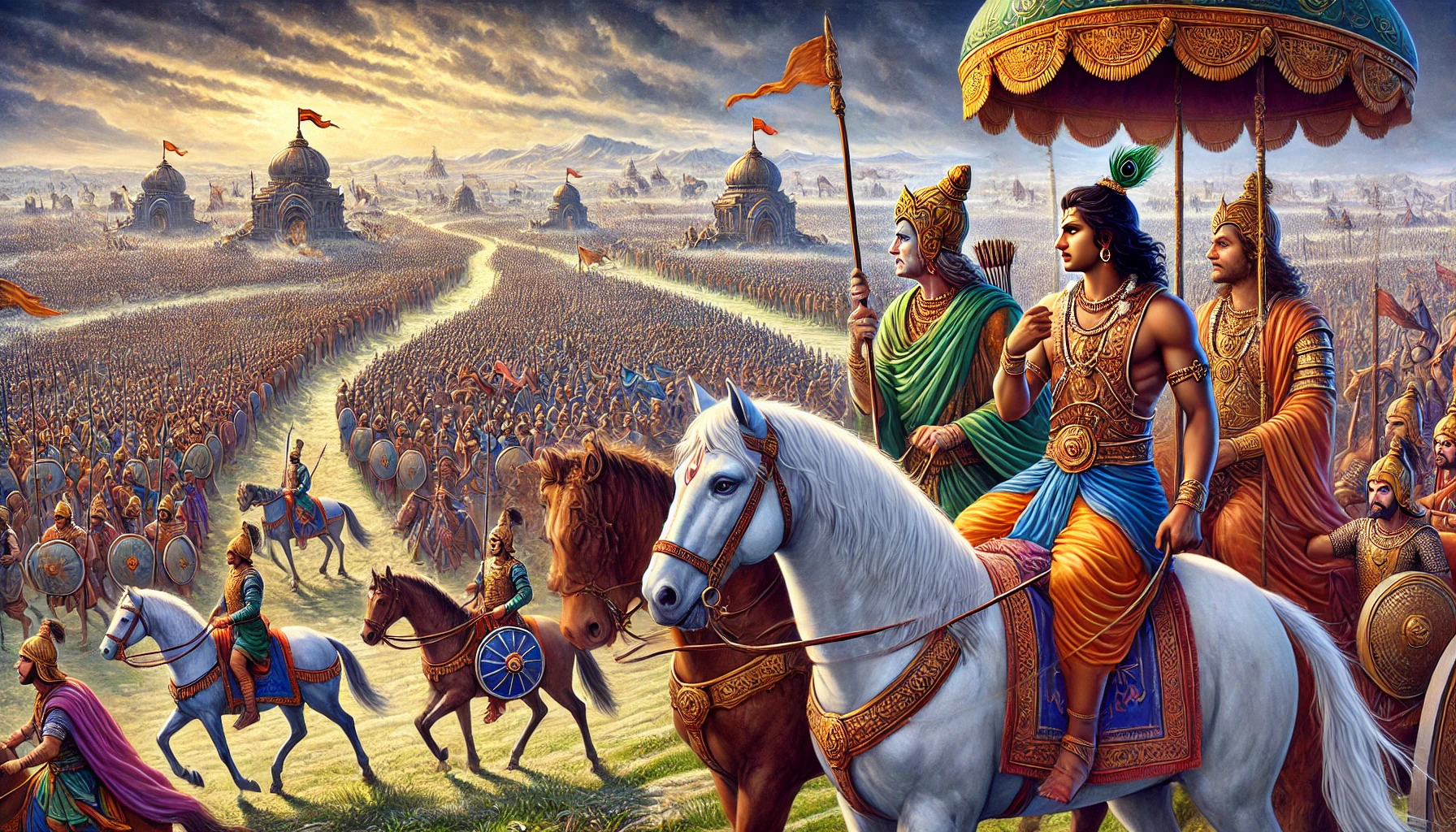arjun_beliefs
Published:

Chapter - 1
**Verse 1.21-22 **
अर्जुन उवाच सेनयोरुभयोर्मध्ये रथं स्थापय मेऽच्युत | यावदेतान्निरीक्षेऽहं योद्धुकामानवस्थितान् || 21 || कैर्मया सह योद्धव्यमस्मिन् रणसमुद्यमे || 22 ||
Arjuna said: “O Acyuta (Krishna), place my chariot between the two armies so that I may see those assembled here who desire to fight, and with whom I must contend in this great war.”
Verse 1.23
योत्स्यमानानवेक्षेऽहं येऽतेऽत्र समागताः | धार्तराष्ट्रस्य दुर्बुद्धेर्युद्धे प्रियचिकीर्षवः || 23 ||
“I wish to see those who have come here to fight, eager to please the evil-minded son of Dhritarashtra (Duryodhana).”
Verse 1.24-25
सञ्जय उवाच एवमुक्तो हृषीकेशो गुडाकेशेन भारत | सेनयोरुभयोर्मध्ये स्थापयित्वा रथोत्तमम् || 24 || भीष्मद्रोणप्रमुखतः सर्वेषां च महीक्षिताम् | उवाच पार्थ पश्यैतान्समवेतान्कुरूनिति || 25 ||
Sanjaya said: “O Dhritarashtra, having been thus addressed by Arjuna, Lord Krishna, stationed the magnificent chariot in between the two armies, in front of Bhishma, Drona, and all the rulers of the world, and said: ‘O Partha (Arjuna), behold these assembled Kurus.’”
Verse 1.26-27
तत्रापश्यत्स्थितान्पार्थः पितॄनथ पितामहान् | आचार्यान्मातुलान्भ्रातॄन्पुत्रान्पौत्रान्सखींस्तथा || 26 || श्वशुरान्सुहृदश्चैव सेनयोरुभयोरपि | तान्समीक्ष्य स कौन्तेयः सर्वान्बन्धूनवस्थितान् || 27 ||
There, Arjuna saw standing both armies — his fathers, grandfathers, teachers, maternal uncles, brothers, sons, grandsons, and friends. Seeing all his kinsmen assembled to fight, Arjuna was overwhelmed with compassion and said:
Verse 1.28-29
कृपया परयाविष्टो विषीदन्निदमब्रवीत् | दृष्ट्वेमं स्वजनं कृष्ण युयुत्सुं समुपस्थितम् || 28 || सीदन्ति मम गात्राणि मुखं च परिशुष्यति | वेपथुश्च शरीरे मे रोमहर्षश्च जायते || 29 ||
“Seeing these kinsmen standing eager for battle, O Krishna, my limbs fail, my mouth dries up, and my body trembles. My hair stands on end.”
Verse 1.30
गाण्डीवं स्रंसते हस्तात्त्वक्चैव परिदह्यते | न च शक्नोम्यवस्थातुं भ्रमतीव च मे मनः || 30 ||
“My Gandiva bow slips from my hand, my skin burns, and I am unable to stand any longer. My mind is reeling, O Krishna, and I foresee only evil.”
Verse 1.31
न च श्रेयोऽनुपश्यामि हत्वा स्वजनमाहवे | न काङ्क्षे विजयं कृष्ण न च राज्यं सुखानि च || 31 ||
“I do not see any good in killing my own relatives in this battle, O Krishna. I do not desire victory, nor kingdom, nor pleasures.”
Verse 1.32-33
किं नो राज्येन गोविन्द किं भोगैर्जीवितेन वा | येषामर्थे काङ्क्षितं नो राज्यं भोगाः सुखानि च || 32 || त इमेऽवस्थिता युद्धे प्राणांस्त्यक्त्वा धनानि च || 33 ||
“O Govinda (Krishna), of what use is the kingdom, or pleasures, or even life itself, when those for whose sake we desire them — teachers, fathers, sons, grandfathers, uncles, brothers, sons-in-law, and other relatives — are standing here in battle, prepared to give up their lives?”
Verse 1.34-35
आचार्याः पितरः पुत्रास्तथैव च पितामहाः | मातुलाः श्वशुराः पौत्राः श्यालाः सम्बन्धिनस्तथा || 34 || एतान्न हन्तुमिच्छामि घ्नतोऽपि मधुसूदन | अपि त्रैलोक्यराज्यस्य हेतोः किं नु महीकृते || 35 ||
“O Madhusudana (Krishna), even though they want to kill me, I do not wish to kill them, even for the kingdom of the three worlds, what to speak of the earth.”
Verse 1.36
निहत्य धार्तराष्ट्रान्नः का प्रीतिः स्याज्जनार्दन | पापमेवाश्रयेदस्मान्हत्वैतानाततायिनः || 36 ||
“O Janardana (Krishna), what happiness shall we derive from killing Dhritarashtra’s sons? Only sin will accrue to us by killing these aggressors.”
Verse 1.37-38
तस्मान्नार्हा वयं हन्तुं धार्तराष्ट्रान्स्वबान्धवान् | स्वजनं हि कथं हत्वा सुखिनः स्याम माधव || 37 || यद्यप्येते न पश्यन्ति लोभोपहतचेतसः | कुलक्षयकृतं दोषं मित्रद्रोहे च पातकम् || 38 ||
“Therefore, O Madhava (Krishna), we should not kill the sons of Dhritarashtra, our relatives. How can we be happy after killing our own people? Though their hearts are overpowered by greed and they see no fault in destroying the family, or in betraying friends.”
Verse 1.39
कथं न ज्ञेयमस्माभिः पापादस्मान्निवर्तितुम् | कुलक्षयकृतं दोषं प्रपश्यद्भिर्जनार्दन || 39 ||
“O Janardana (Krishna), why should we, who can see the sin involved in destroying a family, not turn away from this sinful act?”
Verse 1.40
कुलक्षये प्रणश्यन्ति कुलधर्माः सनातनाः | धर्मे नष्टे कुलं कृत्स्नमधर्मोऽभिभवत्युत || 40 ||
“With the destruction of a family, its ancient traditions perish; and when these traditions are lost, the whole family becomes overwhelmed by lawlessness.”
Verse 1.41
अधर्माभिभवात्कृष्ण प्रदुष्यन्ति कुलस्त्रियः | स्त्रीषु दुष्टासु वार्ष्णेय जायते वर्णसङ्करः || 41 ||
“O Krishna, when lawlessness prevails, the women of the family become corrupted, and from the corruption of women, unwanted progeny (varna-sankara) arises.”
These verses illustrate Arjuna’s inner struggle, as he faces the devastating moral implications of the battle ahead. He is torn between his duty (dharma) as a warrior and his deep sorrow over the potential destruction of his family and societal values.
